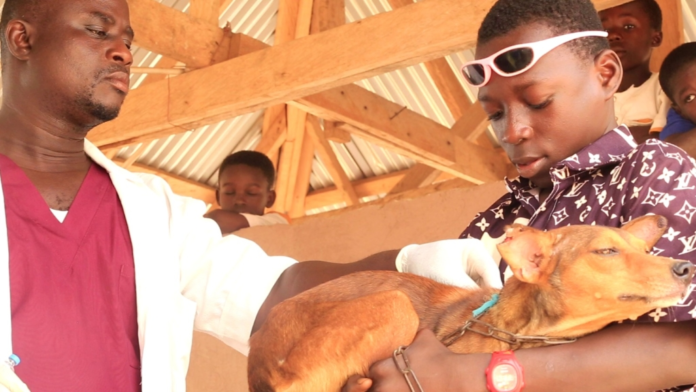Sekyere East District Health Directorate, in collaboration with the veterinary department, aims to vaccinate at least 300 dogs against rabies in four selected communities.
The mass vaccination initiative, inaugurated in Ahwerewa on Wednesday, January 31, 2024, will extend its focus to include cats, aiming to safeguard residents from the threat of rabies.
Irene Efua Acquah, District Veterinary officer, highlighted the significance of targeting communities with a high number of dogs, possibly indicating a heightened prevalence of the disease. She emphasized dispelling the misconception that vaccinating dogs against rabies restrains their hunting instincts, stating, ‘We want to erase such mentality from their minds.’

The launch marks the initiation of an annual vaccination effort for dogs in the communities. Complementing mass vaccination, the strategy incorporates additional approaches, including dog population management and community awareness campaigns on rabies prevention and control.
While the vaccination drive commenced in Ahwerewa, Irene confirmed plans for a coordinated rollout across nearby communities such as Nsutam, Attakrom, and Obaataninkarom.

Dr. Justice Ofori-Amoah, the District Director of Health for Sekyere East, underscored the critical importance of preventing and eradicating rabies. He commended the substantial turnout of residents, emphasizing the need for collaborative efforts to address and prevent the spread of the disease.
In 2023 alone, seven fatalities among children were attributed to rabies cases, underscoring the urgency of concerted action in addressing and preventing the spread of such diseases within the community.
Dr. Ofori-Amoah emphasized that the vaccination initiative aims to protect the entire population, especially young children who are more susceptible to dog bites.

He stated, ‘The goal of vaccinating for rabies is to protect the dogs against rabies, our children who could get dog bites while going to school, and the general public. Anyone can contract rabies.’
Owusu Kofi, a local resident, expressed appreciation for the initiative, noting that prohibitive charges often deter residents from seeking vaccination for their animals. He and Ayettey Ajo were able to have their dogs and cats vaccinated for free, a service that would have otherwise cost them close to 30 cedis.

Irene stressed the importance of Post-Exposure Prophylaxis (PEP) to prevent rabies in humans, indicating a cost of nearly 700 cedis within the district.
She advised residents to treat cases of dog bites seriously, urging, ‘Cases of dog bites should be treated seriously. It is crucial to visit the hospital and ensure you receive the right treatment before considering any other actions.’

